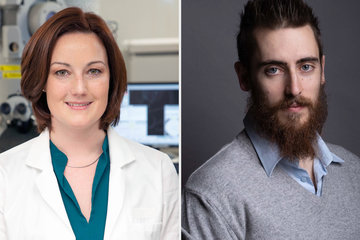Positive Interim Evaluation of the Max Planck Schools
From December 2020 to April 2021, a panel of experts led by Prof. Karl Max Einhäupl, former chairman of the German Council of Science and Humanities and former CEO of Charité Universitätsmedizin Berlin, conducted an evaluation of the Max Planck Schools
At the Max Planck Society’s Senate meeting on June 24, 2021, Einhäupl presented an overall highly positive report the three pilot Schools had recruited promising international doctoral candidates and successfully established a cross-location and cross-organizational network of leading scientists as supervisors, teachers and mentors. The review panel sees a need for further development with regard to active scouting and recruiting, especially of female students and Fellows, as well as in the active networking of the numerous partner organizations.

With the aim of pooling the scientific excellence distributed throughout Germany for the qualification of young scientists, the first three pilot Max Planck Schools were launched in 2018, following a competitive selection process. After almost three years, a first interim evaluation has now been conducted. Three scientific advisors supported Einhäupl as lead rapporteur: Prof. Daniela Perani from Vita-Salute San Raffaele University in Milan for the Max Planck School of Cognition, Prof. Jochen Feldmann from LMU Munich for the Max Planck School Matter to Life, and Prof. Ursula Keller from ETH Zurich for the Max Planck School of Photonics. In addition to the results of a survey among students and Fellows, self-reports of the three pilot Schools, and reports from the Max Planck Society Administrative Headquarters, which is in charge of the pilot phase, virtual visits were carried out at all three Schools.
The interim evaluation focused on structural aspects of the cross-location and cross-organizational doctoral program. Among other things, students and Fellows were asked about the different tracks, such as the five-year direct track with integrated master's degree, or about the design of the lab rotations at different locations. "The structural innovations such as the lab rotations or the digital teaching lab convinced us," Einhäupl explains. "With these structural innovations, the Schools are able to use successful instruments for further development and to pilot new ways in graduate education." The review panel concludes that with these and other elements, the Max Planck Schools offer a complementary approach to existing doctoral programs. The lab rotations, for example, would appeal to doctoral students with an interested in familiarising themselves with different research environments in a mobile and flexible manner within a short period of time.
The early recruitment of young scientific talents directly after receiving a bachelor's degree and its support, for example, through a paid research internship lasting several weeks, were also rated very positively. Moreover, the networking aspect across several organizations provided added value for students as well as Fellows, so Einhäupl. Smaller institutions would particularly benefit from this. According to Einhäupl the next steps should be to leverage synergistic potential locally with all partners – a particular challenge given the current 24 universities and more than 30 non-university research institutes – and to further strengthen the respective Schools' identities.
The increase in both the quantity and quality of applications (i.e., tripling of application numbers and increase in cohort strength) shows that the Schools are becoming more visible nationally and internationally; even the pool of non-accepted candidates is very good. Partners should make more use of this excellent pool for their own programs, the review panel recommended "However, more time is needed to reach the goal of the three pilot Schools to recruit talent in direct competition with internationally leading scientific institutions in their respective research fields," Einhäupl stated. To achieve this, he said, it was necessary, among other things, to focus to an even greater extent on diversity.. In particular, suitable female candidates and students should be explicitly addressed and promoted, for example through active mentoring or by increasing the visibility of the female role models within the Schools' extensive network.
In general, the environment for the Max Planck Schools remains challenging. This is because their nationwide network encounters different regulations of the various funding organizations, the federal system and differentiated state legislation, as well as a limited funding phase. These circumstances make it difficult not only to build a sustainable, resilient partner network, but also to make individual funding commitments to students. "The Max Planck Schools are an outstanding opportunity to break new ground for doctoral education in a complex environment. All partners, including the BMBF, which is funding this project with almost 48 million euros, should take advantage of this unique opportunity and use the innovative impulses of the Max Planck Schools to further develop the German science system with a view of making it more flexible and international with appropriate framework conditions," said Einhäupl.
The Max Planck Schools are a joint graduate program of currently 24 universities and more than 30 non-university research institutes. Ambitious and talented doctoral students are offered the opportunity to study in a research-focused and interdisciplinary manner, in close exchange with their supervisors, who are leaders in their respective fields. Within the framework of this unique network, PhD students benefit from early access to a versatile and first-class research infrastructure, to innovative teaching formats and to renowned scientists in the research fields of Cognition, Matter to Life, and Photonics. Key partners playing a prominent role in the pilot phase are the Friedrich Alexander University Erlangen-Nuremberg, the Friedrich Schiller University Jena, the Georg August University Göttingen, the Heinrich Heine University Düsseldorf, the Humboldt University Berlin, the Karlsruhe Institute of Technology, the Technical University Munich, the Universities of Heidelberg and the University of Leipzig, the DWI Aachen, the Fraunhofer Society and the Max Planck Society. The Federal Ministry of Education and Research is funding the pilot phase with 48 million euros.












